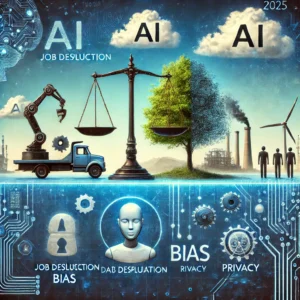Disadvantages of AI in 2025: Challenges for Society and Digital Companies
Artificial Intelligence (AI) has transformed industries worldwide, revolutionizing how we work, live, and interact. However, as we enter 2025, the rapid expansion of AI comes with significant challenges that society and businesses must address. This article delves into the disadvantages of AI, highlighting its societal impact and how it affects digital companies.

1. Job Displacement and Unemployment
AI-powered automation is replacing human labor across industries, from manufacturing to customer service. While this improves efficiency and cuts costs, it also threatens millions of jobs, especially those involving repetitive tasks.
- Key Statistics: By 2025, an estimated 85 million jobs will be displaced due to automation, with developing economies being hit the hardest.
- Impact on Digital Companies: Automation helps companies reduce costs but invites criticism for causing unemployment. Digital companies may face reputational damage as they are often perceived as the drivers of automation.
2. Bias and Ethical Concerns
AI systems are only as unbiased as the data they are trained on. When training data contains prejudices or systemic inequalities, AI systems can perpetuate and amplify these biases.
- Examples: Hiring algorithms rejecting candidates based on gender or race, and biased AI in policing and judicial systems.
- Impact on Digital Companies: Companies that use AI for recruitment, customer service, or content moderation may face lawsuits, fines, or public backlash if their algorithms produce unfair outcomes. Ethical lapses could lead to loss of customer trust.
3. Security and Privacy Risks
AI systems collect and process vast amounts of data, from facial recognition to browsing habits. This makes them prime targets for hackers and cybercriminals.
- Implications: Breaches in AI systems can lead to identity theft, fraud, and misuse of personal data.
- Impact on Digital Companies: Digital platforms using AI face increased regulatory scrutiny and risk losing customer trust in the event of data breaches. Moreover, compliance with stricter privacy laws could increase costs.
4. Over-Dependence on AI
AI is now integral to decision-making in many sectors, from healthcare to finance. However, relying too heavily on AI can lead to unintended consequences.
- Risks: Over-dependence on AI reduces critical thinking and increases vulnerability to system failures. For instance, an error in a self-driving car system could cause accidents.
- Impact on Digital Companies: Over-reliance on AI-driven processes like ad targeting or fraud detection can lead to operational disruptions if the system malfunctions or is exploited.
5. Environmental Impact
The computational power required to train AI models has a significant carbon footprint. Training large-scale models consumes vast amounts of energy, contributing to global warming.
- Statistics: Training a single large AI model can emit as much carbon as five cars over their entire lifetimes.
- Impact on Digital Companies: Digital companies using AI face criticism for their environmental impact. Consumers are becoming more eco-conscious, and businesses may need to invest in green technology, increasing operational costs.
6. Increased Competition in the Digital Industry
AI is becoming more accessible, enabling startups and small businesses to compete with established players. While this fosters innovation, it also creates a saturated and highly competitive market.
- Implications: Established companies may face price wars, reduced profit margins, and challenges maintaining market dominance.
- Impact on Digital Companies: To stay competitive, businesses will need to continually innovate, which could lead to higher R&D expenses.
How These Challenges Affect Digital Companies
Digital companies, which are often at the forefront of AI adoption, face unique challenges:
- Public Perception: Job losses, data privacy issues, and biased algorithms can lead to public backlash. Companies need to maintain transparency and ethical practices to safeguard their reputation.
- Regulatory Compliance: Governments worldwide are introducing stricter AI and data privacy regulations. Compliance requires additional resources and could slow down innovation.
- Sustainability Pressure: Consumers are increasingly demanding eco-friendly practices. Companies must address the environmental impact of their AI systems to maintain customer loyalty.
Frequently Asked Questions (FAQs)
1. How does AI impact job opportunities in 2025?
AI automates repetitive tasks, reducing the need for human labor in certain industries. While this creates high-skill jobs in AI development, it leads to job displacement in roles requiring less technical expertise.
2. What ethical issues are associated with AI?
Bias in algorithms, misuse of surveillance tools, and discrimination in decision-making processes are major ethical concerns. These issues can damage trust in AI systems and the companies that use them.
3. How does AI pose privacy risks?
AI systems collect vast amounts of sensitive user data. If hacked or misused, this data could lead to identity theft, fraud, or other privacy violations.
4. Why is over-reliance on AI dangerous?
Over-reliance on AI reduces critical thinking and increases risks associated with system failures. A malfunctioning AI system can disrupt entire operations or result in catastrophic outcomes.
5. What is the environmental impact of AI?
AI requires significant energy for training and operation, contributing to increased carbon emissions. As the demand for AI grows, its environmental impact becomes a pressing issue.
6. How does AI increase competition in the digital industry?
AI tools are becoming more accessible, allowing startups to compete with established digital companies. This creates a more saturated market and forces businesses to invest more in innovation and differentiation.
Conclusion
While AI brings transformative benefits, its disadvantages cannot be ignored. Society must address issues such as job displacement, ethical concerns, and privacy risks, while digital companies must adapt to stricter regulations, heightened competition, and sustainability demands.
By embracing transparency, ethical practices, and sustainable innovation, businesses can mitigate the challenges of AI and ensure its responsible growth.